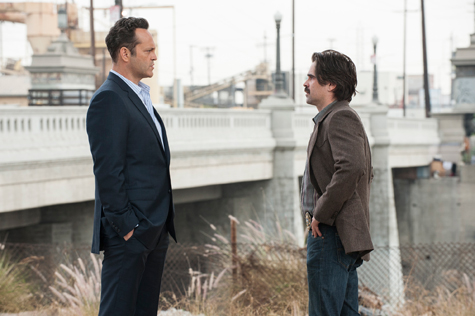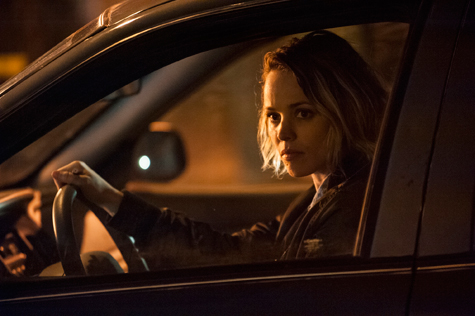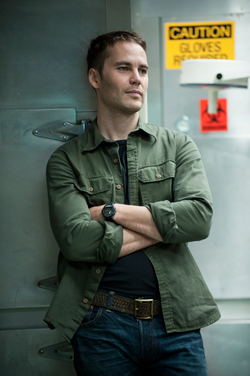
“We get the world we deserve.” – Ray Velcoro
After so much dense setup in the first episode, if you were hoping for more room to breathe and enjoy time with the characters—morose as some of them are—you only get a little here, as the tightly interconnected story weaves outward, crammed close like the Los Angeles sprawl that the helicopter shots keep showing us between scenes. We get some very brief moments of levity as Ray and Antigone begin investigating Caspere’s murder, but the story remains in a very dark place.
Frank can’t sleep. Jordan tells him to stop thinking, echoing Pascal’s lament that “All of humanity's problems stem from man's inability to sit quietly in a room alone.” Frank tells her what keeps him up at night, the fear that he died a long time ago, when his drunken father locked him in the basement alone while he was out on a bender, and didn’t return for several days. Leaving young Frank to beat a rat to death in the dark, as the power went out. Frank doesn’t say whether he ate the rat or not, but it’s a distinct possibility, and Jordan asks how many stories like this Frank is holding inside. And we can guess that there are a lot. He’s the most introspective of the characters, to say the least; the others seem oblivious of their wounds and scars and how they affect their behavior.
Ray has flashes of clarity, but needs to be a good father to his son so badly that he destroys any chance of it beyond all recognition, and wants to get points for trying. The first episode’s cathartic bully-beating predictably blows up in his face, despite his suggestion that “Sometimes a good beating promotes personal growth.” His ex-wife is rightfully terrified by his behavior and wants full custody, threatening a paternity test to prove what is obvious to the point of comedy to the audience and everyone else, that little freckled Chad is not Ray’s son. We also get a hint closer to learning what Ray did to the rapist who sired the boy, when she tells him not to say that he “did that for her,” and he responds that “he had a right, by natural law.” Later, making small talk with Antigone, Ray calls himself a feminist. And while this sounds ridiculous, it gives us a glimmer of the battle Ray fights inside between the man he’s become and the man he wants to be. Like most drunks, he has two faces, one of integrity and one of corruption, a violent mask of patriarchal masculinity and the smile of a loving father and husband. And it’s a fight that is literally killing him, as the episode goes on.

Ray, Ani, and Paul view the autopsy of Caspere, and lip service is paid to why three cops from three different departments are working the case, apparently with no assistance at all. Vinci is a dirty town, both figuratively and literally—in trademark True Detective exposition, we learn that they process 27 million tons of toxic waste every year—and by putting a cop embroiled in a very public tabloid scandal, and the troubled Antigone and Ray on the case, it seems like everyone just wants both the Caspere murder and the Vinci corruption expose to just go away. Ray knows the score. He asks outright, “Am I supposed to solve this or not?”
We get some gory details beyond the Oedipal acid shot to Caspere’s eyes. His genitals were excised via a 12 gauge shotgun. They follow up with Caspere’s therapist, who begrudgingly reveals what we expected, that his patient was sexually obsessive, though passive. He also is familiar with “the good people,” meaning Antigone’s father and his followers. “There’s all kinds of seekers in the world. All kinds of truth,” he says. Antigone’s response: “Of the five kids who grew up there, two committed suicide, and two are in jail.”
“What about the fifth?”
“She became a detective.”
The show is better than CSI: Miami soundbites like that, and we get a taste of it as Ani and Ray drive around following up on an escort named Tasha who Caspere used, and they talk. This was one of Season 1’s strengths as well, and while there’s nothing as memorable as Cohle’s nihilistic koans, we do get to see a side of Ray where he seems briefly happy, perhaps flirting with Ani using his sad-puppy, bad-boy eyes, warning her of the “rumors” that he killed a rapist who brutalized his wife, and is in the pocket of a Southland mobster, that he’s got a busted marriage and a lot of bad habits, all things we know to be true. He asks her about the knives she festoons herself with, and her response is the most memorable scene of the episode, and mind you, this one starts with a kid locked in a basement with hungry rats, and a guy getting his junk shot off.
“Imagine a job where everyone can physically overpower you. No man could deal with that without going insane. The fundamental difference between the sexes is that one can kill the other with their bare hands. Any man that tries that with me will bleed out in under a minute.”
This just skims the surface of Ani; alone, she drinks and surfs the net for hardcore porn, and she’s not looking for her sister Athena.

Frank is the big player, as he investigates the Catalyst deal and finds out that Caspere was screwing him, he is inadvertently setting himself up as the prime suspect. To fend off signs of weakness, he sheds the legitimate businessman schtick and gets his hands back in the game, present as his men beat up a bookie and doing some PI work of his own, asking prostitutes at a club run by one of his associates—a charming fellow with a gold grill that reads “f—- you”—if any of the girls were hired by Caspere. He passes the information on to Ray, perhaps proving that these three cops were put on the case to kill it, as he gets more traction in a few minutes than they do, driving all over the county following leads.
The episode ends with Ray investigating Caspere’s sex pad, where he finds animal masks, a harness, and a pool of blood. Which for some reason makes him put his gun away. He finds recording equipment and a hard drive, as well. And with a distinct nod to the creepiness of which we were so fond of in season one, he is confronted by an individual wearing a large raven mask and wielding a shotgun, and we’re given an ending that we most certainly did not expect.
True Detective has always been in part about playing with tropes, and at times it feels like Nic Pizzolatto is trying to cram as many as he can into the story to see how they bounce off one another, but he also uses them in strange ways to surprise us. We get the therapist who looked like he walked off the cover of a ‘70s Warren Zevon album oozing sleaze, the scarred waitress who is the only person who bears her wounds on the outside, and at least two suicidal cops, all swirling around a California story of land deals, secret sex societies, feelgood cults, gangsters and towns rotten to the core. All we’re missing is the beat-up detective who washes all his wounds away with one hot shower; next Sunday, watch the opening of Episode 3, and tell me the joke’s not on us.
Thomas Pluck is the author of the World War II action thriller Blade of Dishonor, Steel Heart: 10 Tales of Crime and Suspense, and Hot Rod Heart: A Noir Novelette. He is also the editor of the anthology Protectors: Stories to Benefit PROTECT and hosts Noir at the Bar in Manhattan. His work has appeared in The Utne Reader, PANK Magazine, McSweeney's Internet Tendency, Hardboiled, Needle: A Magazine of Noir, Crimespree, and numerous anthologies, including the upcoming Dark City Lights, edited by Lawrence Block. You can find him online and on Twitter as @thomaspluck.
Read all of Thomas Pluck's articles for Criminal Element.

‘…the therapist who looked like he walked off the cover of a ’70s Warren Zevon album oozing sleaze…’
The therapist was played by Rick Springfield, the rocker/actor who played the original vampire cop, Nick Knight, in the TV-movie that spawned the syndicated series starring Geraint Wyn Davies.
Make of that what you will…